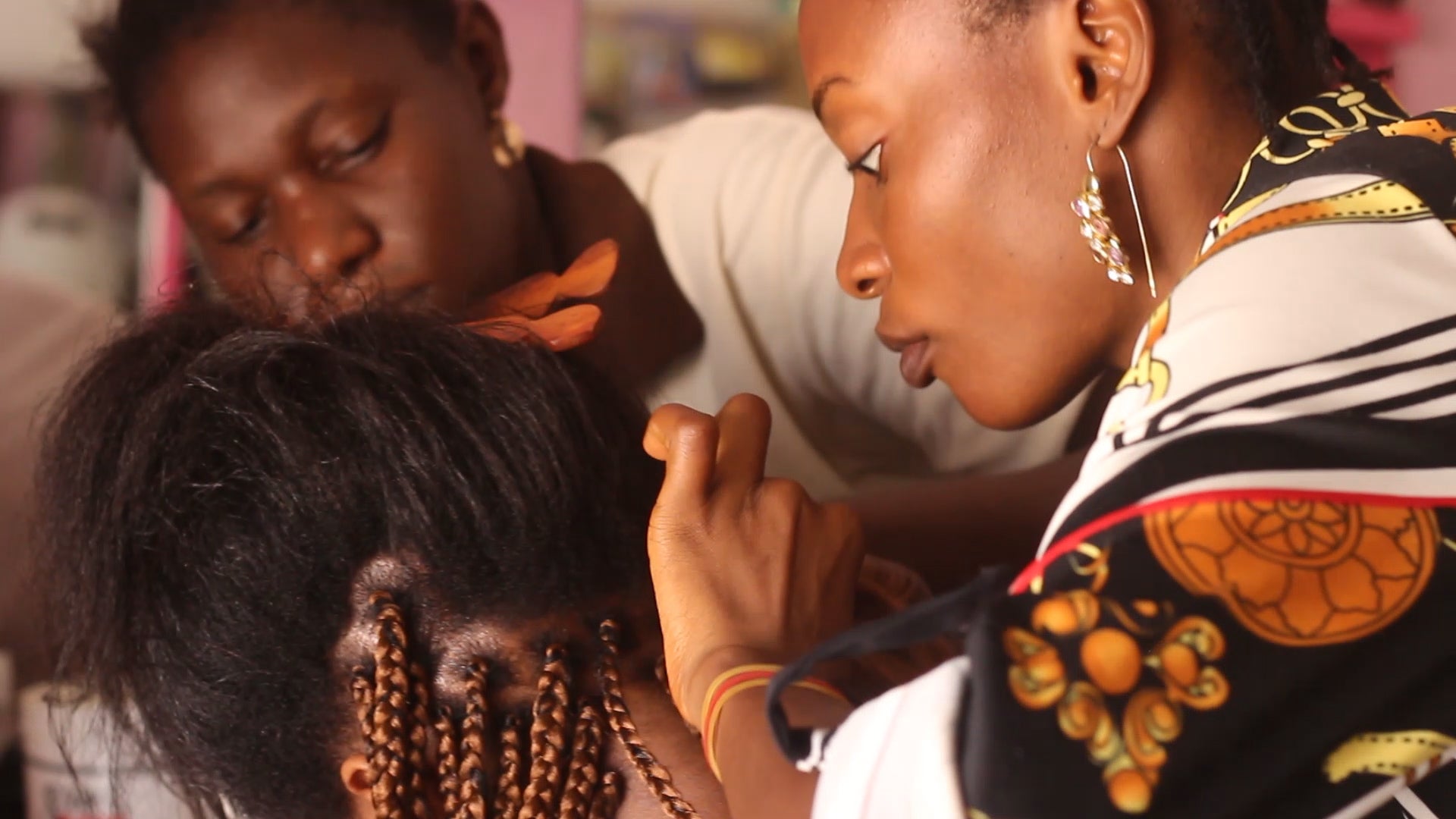As protests rage on and the conversation about police brutality and racism continues around the world, a different conversation about racism, discrimination and colonialism is taking place in Nigeria through the lens of hair. Nigerian-American influencer Seun Okimi was moved to explore what was happening with the Natural Hair Movement—or lack thereof—in her home country through her short documentary, The Truth About The Use of Relaxers in Nigeria.
On a trip to Nigeria one summer she saw a young girl laying in the street getting her hair relaxed and it sparked a curiosity in her about the stark contrast in ideology around hair between her two homes—Nigeria and the United States.
ESSENCE talked extensively with Seun about what she uncovered during filming and how it all ties into the conversations that are happening right now about racism, colorism, and Black identity.
To relax or not to relax, and why?
Why did you want to do a documentary about relaxed hair right now?
I’ve always been fascinated by hair. It’s been interesting as someone raised in a Nigerian household, but still experiencing the Black American life and being a part of both of those identities, constantly seeing the differences and how a lot of things are perceived, one of those things being hair. Then with having relaxed hair on YouTube, in the rise of the whole natural hair movement happening in America, I would get so much hate. And it was just so interesting going back to Nigeria, seeing how normal it was still. I felt like I have to talk about this. I have to show this other side of how relaxers are seen and accepted in Nigeria.
By the end of the documentary we saw Nigerian women exploring the idea of going back to natural. What was at the root of this pivot?
It’s seeing two, three, four people that other people look up to and seeing them carry themselves with their natural hair really proudly and really boldly. It makes those people who are watching them look at them and be like, ‘Oh wow, I want to be like her. I want to do what she’s doing. I want to have hair like her,’ and then they copy it. Then people within that person’s sphere of influence will see them and want to do the same thing as well.
 A woman with relaxed hair getting traditional braids(Seum Okimi)
A woman with relaxed hair getting traditional braids(Seum Okimi)
Do you think those influencers are coming from a place of wanting to get Nigerian women to embrace their natural beauty or is it simply personal choice?
I’m not sure. I think a big thing that was also talked about was just the fact that relaxers a lot of times are just not done properly. So a lot of people end up with scalp burns, their hair is falling out, they just are not having a good time with relaxers at all. I was talking with one of my friends about this and she was saying even with relaxed hair as the norm, there are people who really hated relaxed hair and knew that it was not good for them but they needed some type of social ‘go’ to go natural.
So it is somewhat similar to what happened here in the U.S. Black women are going natural for hair health and to reject colonial standards of beauty.
I think at the beginning [relaxers] can definitely be tied back to colonial presence and a white influence. I think as time went on, that kind of became forgotten and people didn’t link between relaxers and the white man. My grandmother was the only person to mention race and whenever I brought it up at the end to Mimi [the college student I interviewed], she looked at me like I was crazy. She never thought of it in that way, never thought of that connection. I think while it probably has its root in that, over time it kind of got lost and just became, I guess, fashion and trend.
 Seun and her grandmother during filming(Seun Okimi)
Seun and her grandmother during filming(Seun Okimi)
One thing you touch on is this idea that women in Nigeria don’t have to assert their Black identity through their hair.
People [in Nigeria] don’t identify themselves as Black until I guess there’s something opposing their Blackness. So I was talking with one of my friends who was an international student from Kenya. He went to my university and it was his first time living in America. He said he didn’t consider himself Black, even though he has the same skin color as me. He was said, ‘I don’t feel like I have lived the Black experience. I’ve never had to contrast my Blackness with another person’s whiteness. I don’t feel like I can identify as a Black person.’
That’s interesting and not often said out loud.
It’s something that a lot of people living in African countries really think as well. They don’t necessarily consider themselves Black. It was a very subtle thing in my documentary when I brought up the whole natural hair movement that’s happening in America. Mimi was trying to reason it out and think of reasons why that could be happening and why it was tied to race. She was saying in the documentary, ‘Oh, maybe it’s because they’re Blacks and they think blah, blah, blah.’ But in doing that she was kind of saying because they are a group of people that identify as Black, not necessarily considering herself as a Black person.
From what you’ve seen, is it a culture shock that leaves people more or less confused about who they are once they leave the continent?
Yeah definitely! I have family who moved from Nigeria recently and I’m also friends with a lot of international students at my university. They never had to confront Blackness specifically. It’s something that they always care about, but they never really understand until they get here and they have to experience prejudice and people looking at them differently because of the color of their skin. We hear a lot about Black pride and what Black people are doing, but it’s always from a Black identity in the midst of white identities [in the U S.]. It’s something that they never really thought of and had to confront until they got here.
Did you ever feel differently about your relaxed hair or ever consider going back to natural after having these conversations and filming the documentary?
It’s definitely something that I’ve questioned a lot, especially with getting all the criticism [on YouTube] with people asking why am I still relaxed. I remember one person saying, ‘It brings tears to my eyes to see you try and be something else that you’re not.’ Why should I be making you cry? I don’t even know you. And I don’t hate myself.
 Seun Okimi in Nigeria(Titilayo Okimi)
Seun Okimi in Nigeria(Titilayo Okimi)
But after leaving Nigeria I’m still relaxed and I don’t think my perspective changed that much on my own relaxed hair. I do, in a sense, agree with the sentiment of a lot of Nigerians that it is just choice, even though I also think it’s important to have conversations and understand why certain norms are in place and why we do certain things with our hair. I think of myself as a creative whenever it comes to my hair. I just like being able to create and I think it’s nice to not necessarily feel that burden or place that burden on yourself that you need to be natural to showcase Black beauty and be a representative for Black beauty.
The post Why Nigeria Is Still Embracing Relaxed Hair appeared first on Essence.

